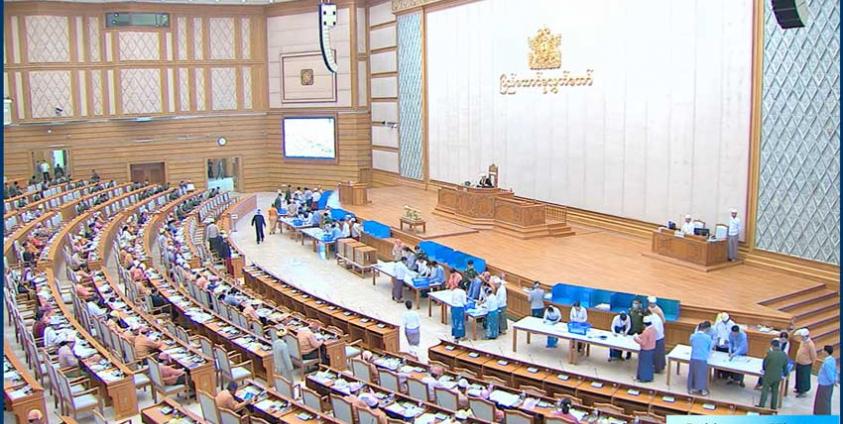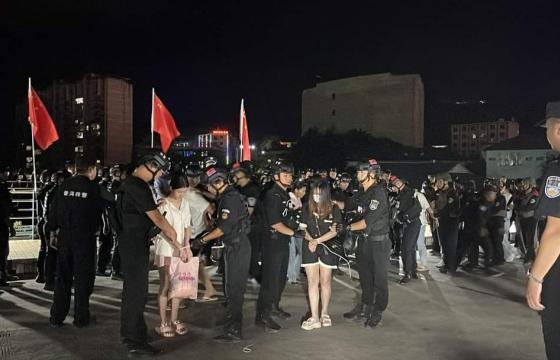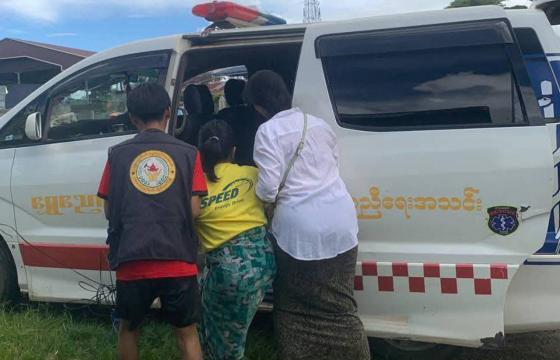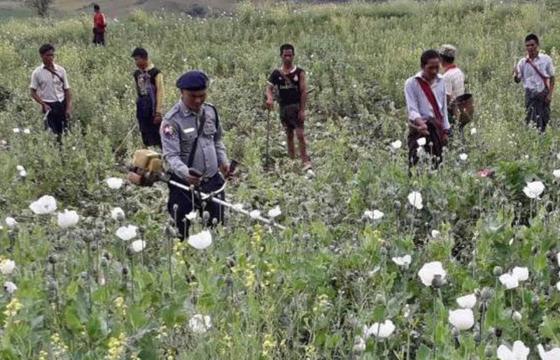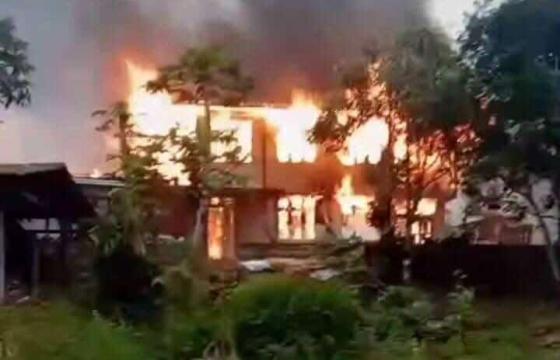Sai Wansai — As the National League for Democracy (NLD)-led constitutional amendment 114 proposals, plus 21 other proposals by the military bloc, Union Solidarity and Development Party (USDP) and 25 percent appointed military MPs, came to an end on March 20 which started out on March 10, the results as expected were a total failure.
Of all 135 article amendment proposals only 4 were approved. Thus it is through and through a complete non-fulfilment of the NLD-led constitutional amendment, including also the military bloc proposal, so to speak.
And the said amendment proposals approved were Article 32 (a) and (b); Article 344; and Article 262 (a), which were concerned with only changes of words or vocabularies in Burmese language for the three former ones; and deleting of a phrase in the latter one.
The changed wordings in Article 32 (a), (b) and Article 344 include (Oh Min Ma Swan – frail elderly) to (That Kyi Ywe Oh – advance aged elderly) and (Ma Than Ma Swan) to (Ma Than Swan), which both means “disable” except the deleting a “Ma” which was doubly used and has a meaning of negation. But it is merely a different choice of words and no alteration of meaning in any sense.
Article 262 (a) stated the Chief Minister of the Region or State shall:
(i) select suitable persons who have prescribed qualifications under Sub-Section (a) of Section 261, from among the Region or State Hluttaw representatives or from among persons who are not Hluttaw representatives concerned.
The phrase “from among the Region or State Hluttaw representatives or from among persons who are not Hluttaw representatives concerned,” was agreed to be deleted by the parliamentary session, which was unnecessarily added and could be deleted without changing the article intention.
However, Article 32 still needs to go for national referendum as the next step, in which 50 percent of eligible electorates have to approve it, while Article 344 and Article 262 may not need to go for referendum as 75 percent affirmative vote in the parliament is enough to amend them, according to the constitutional amendment procedure.
Most of the NLD proposals are fixed on weakening the military or Tatmadaw power within the parliament, which includes gradual, step-by-step withdrawal from its 25 percent appointed MPs allotment entitled by the 2008 Constitution.
Accordingly, the NLD suggested gradually reducing the military’s share of seats from 25 percent to 15 percent after the 2020 election, 10 percent after 2025 and 5 percent after 2030. The proposal only received 404 votes, less than 62 percent of lawmakers.
Moreover, the NLD proposals also seek to bolster the presidential power in emergency declaration situation instead of the commander-in-chief’s power given by the constitution. Apart from all these it also tried to change words that give the military supremacy role in political decision-making process, either by nullifying some such articles or deleting unnecessary add-up terms in the constitution like prefix word “disciplined” to the word “democracy”.
Other important proposals include the beefing up of more elected civilian ministers in National Defence and Security Council to upset the military majority of 11 members and
ending the military’s absolute authority over all national armed forces, including its exclusive role in safeguarding the country, which were all not successful.
In order the proposals to be able to sail through the first reading in the parliament 491 votes are needed to overcome the endorsement ceiling of 75 percent, which the NLD hasn’t been able to do so. Thus, even the secret voting system applied hasn’t ushered in a change of heart from some of the Tatmadaw MPs, which the NLD might have hoped for but didn’t materialize as all could see by the uniformed voting results of strictly following the order.
In the same vein, the USDP’s proposal to appoint chief minsters by 14 states and regions was voted down, including all other measures that were proposed.
The bill submitted by USDP lawmaker Thein Tun called for amending the Article 261(b), which gives the president the power to appoint chief ministers in Myanmar’s 14 states and regions and replace it with their local MPs endorsement, wasn’t successful.
Moreover, in Article 261 (a), which the military bloc wanted to add up another criteria that the chief minster’s spouse and family members mustn’t be foreigners or foreign passport holders also did not pass the 75 percent vote ceiling hurdle.
ANP and SNLD
While some ethnic political parties’ (EPPs) MPs probably sided with the NLD to gradually phase out the 25 percent military MP seats allotment, concerning the Article 261 (b) to curb the presidential power of appointing the chief ministers in ethnic states and regions tabled by the military bloc was endorsed by some EPPs’ MPs.
Regarding Article 261 (b) on March 17 session, 631 lawmakers participated in the vote, while 23 were on leave. The measure received 239 votes in favor, and 388 objections, with four disqualifications.
Looking at the voting pattern it could be clearly seen that the NLD MPs voted in unison against the bill, while the USDP, Arakan National Party (ANP), and the military voted in favor of it.
ANP lawmaker Pe Than from the lower house of parliament said NLD lawmakers who rejected the bill made it clear that the party opposes political decentralization, even though the MPs from the USDP and EPPs supported it.
“It is ironic that a major democratic party is rejecting all attempts for decentralization,” he said. “It is tragic for our (non-Bamar) ethnic nationalities because they are not allowing us to experience the essence of federalism. This has become a major roadblock in the long journey ahead,” according to the recent RFA report.
Echoing the same sentiment regarding the proposed measure, Shan Nationalities League for Democracy (SNLD) Joint-Secretary Sai Leik on March 12 told the Voice Weekly Journal: “Because of this some groups see the NLD in a different light and lend their support to the party that endorsed the changing of Article 261,” adding, “ We want to amend the Article 261 but we understand that it is hardly enough for us to create a holistic path which we like to walk.”
In this connection he said: “They (NLD) have changed 114 points and we (SNLD) have changed some paragraphs that they dared not touch. Since they didn’t give their opinion, the paragraphs were left untouched in original forms. In this case it meant that other democratic parties’ change proposals were not endorsed. This can be taken if the proposals are not the same as the NLD they won’t support and won’t work with them.”
“That’s why if we talk about amendment, the NLD 114 arranged points and the proposed result (stemming from majority decision of 45-person constitutional amendment joint-committee made up of several parties of which NLD has the majority) were also exactly the same (which was tabled in the parliament for debate and later voting). I see that the NLD is too greedy and very weak in cooperation, with the ethnic parties,” he added sarcastically.
Analysis
The NLD-led constitutional amendment is a total failure, given the amount of time and tax-payers’ money spent. As all can see, the NLD with its 59 percent vote, even if some 11% of the EPPs will be combined, won’t have a chance to overcome the 75 percent vote ceiling. And it is not a wonder that the NLD deliberations came to naught.
While the NLD efforts to limit the military political clout within the parliament were endorsed by the EPPs, the Article 261 amendment tabled by the military bloc was supported by some MPs of the EPPs, which is the exact opposite position of the NLD.
Thus, to sum up, the EPPs gain nothing by siding with the NLD to limit and weaken the military bloc political veto power, as 25 percent appointed military and USDP combined votes could effectively block the constitutional amendment deliberations of the NLD, while its proposed measures include nothing to amend the constitution to become federal and democratic.
In all, the Tatmadaw and NLD trust-building, which is already on the wane deteriorated further, while the NLD relationship with the EPPs, which hasn’t existed ever since 2016 when it came to power, continues to degenerate unabated.
In this trajectory, the NLD, military bloc and the EPPs have only achieved a result of “lose-lose” outcome, without being able to advance the aspirations of the people to coexist peacefully in a federal democratic atmosphere.


